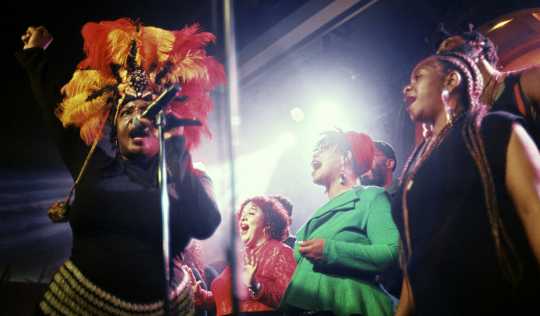|
Rahsaan Roland Kirk’s 1968 album Volunteered Slavery included the tune “Spirits Up Above,” a post-bop blues masterpiece. One reviewer noted that “The harmony, rhythm, and melody comes not only from the masters… but also from the collective heart of the people the masters touched.” Jimetta Rose has recreated Kirk's spirit, modernized it and at the same time created a historical sound. Other musicians who inhabit this space of channeling a sound from the past with a tsunami of modern jazz are Angel Bat Dawid and Georgia Anne Muldrow, so it is not surprising that Rose has collaborated with both of them.
The first song on the album “Let the Sunshine In” would fit in well at a gospel church or in a production of Hair, the 1967 Off Broadway hit, Although it is certainly not apparent from the quality of How Good It Is, the musicians on this album are largely amateurs, selected based on their interest in healing themselves and others, The Voices of Creation, a multi-generational group, includes Sly Stone’s daughter Novena Carmel, a radio DJ for KCRW, who joins the crew as an alto in the choir.
Rose is a native of Los Angeles and is part of the independent music scene there. She, like many jazz performers, uses R&B, Hip-Hop and choral jazz to make her distinctive sound. Parts of this album channel Charles Mingus; think “Wednesday Night Prayer Meeting.” Raised in church and choir from birth, the soul-jazz singer easily conjures the sound of gospel music and then enhances it with other genres.
“Let the Sunshine In” builds as the piano lifts the song and the chorus sings, "We are the Voices of Creation, we came to bring you life." Rose says her inspiration for the album was to give herself comfort, “you are not alone.” These words are remarkably uplifting as the pandemic wears on. Joyousness repels darkness. As Arlo Guthrie says, “You can't have a light without a dark to stick it in.”
Her take on Kirk’s “Spirits Up Above” starts with Rose scatting the opening lines with the chorus rising up. The group repeats, “Can you feel the spirits up above?”
Jack Maeby’s organ is featured prominently throughout the album. Maeby grew up in upstate New York, where he began playing music professionally while in high school. He built a career playing piano and organ behind acts such as Etta James, Otis Rush and Lowell Fulson. His playing on the title track guides the chorus in a gospel direction at first which then glides into that past meets the present jazz/R&B sound.
The percussionist, Allakoi Peete, who recently joined Kamasi Washington on 'The Garden Path' gives How Good It Is an Afro-percussive harmony.
Funkadelic’s “Cosmic Slop” gets a wonderful reworking on the album. “Then the devil sang: Would you like to dance with me? We're doing the cosmic slop.” The 60’s funk/rock group out of Plainfield, NJ deserves this resurrection as a choral jazz group. In Rose’s rendition, we hear “Ah hear my mother call” with Peete’s percussion and hand clapping guiding the tune forward. It takes the song one step further, invoking the listener to "Answer The Call."

|
|
This six-track album, which was recorded at a church in East Pasadena, California is so much more than a community chorus getting together for an afternoon performance. The album ends with the song “Ain’t Life Grand,” a rollicking, hand clapping, joyous conclusion. And although it was recorded in a church and has elements of traditional gospel music and a spiritual jazz element to it, the atheists in the room won’t be put off by the spiritual lyrics here. The gods on this album also include Pharoah Sanders, Sun Ra and John Coltrane, who circle around like apparitions, supporting Rose as she carries their music forward.
Find the artist online.
|
